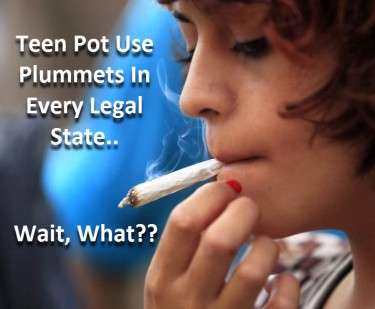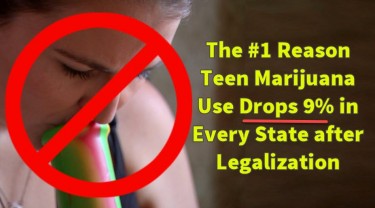Teen Marijuana Use Has Fallen Off a Cliff and the Government Wants to Know Why?
Cannabis prohibitionists love to argue ludicrous claims about how cannabis legalization will be horrific and detrimental to society.
One of their claims is that legalizing cannabis, and making it more publicly available, will cause drug addiction especially among teens. However, we now have more proof that it does the opposite, with widespread marijuana legalization actually causing the opposite – resulting in a decline of consumption among teens.
Last month, the University of Michigan released their annual Monitoring the Future survey which shows a dramatic year-on-year decrease among teen’s use of cannabis – as well as other controlled substances. They found a 33% reduction among 8th graders’ reported cannabis use, 38% drop among 10th graders, and 13% drop among 12th graders. “The percentage of students who reported using marijuana (in all forms, including smoking and vaping) within the past year decreased significantly for eighth, 10th, and 12th grade students,” write the authors.
“We have never seen such dramatic decreases in drug use among teens in just a one-year period,” says Nora Volkow, director for the National Institute on Drug Abuse, who funded the study. “These data are unprecedented and highlight one unexpected potential consequence of the COVID-19 pandemic, which caused seismic shifts in the day-to-day lives of adolescents,” she says.
Dr. Volkow joined a podcast last September 2021 with Ethan Nadelmann, who was once the Director of the Drug Policy Alliance, who then said that statewide recreational cannabis legalization around the country didn’t cause a jump in young people using the drug. Then in December, she says during an interview that there was no evidence smoking cannabis caused harm.
“The Biden-Harris Administration is committed to using data and evidence to guide our prevention efforts so it is important to identify all the factors that may have led to this decrease in substance use to better inform prevention strategies moving forward,” explains Dr. Rahul Gupta, the White House’s Director for National Drug Control Policy. “The Administration is investing historic levels of funding for evidence-based prevention programs because delaying substance use until after adolescence significantly reduces the likelihood of developing a substance use disorder.”
The results from Monitoring the Future also revealed that there was a significant drop among cannabis consumption in teens aged 12-17. “The latest findings add to the growing body of scientific literature showing that marijuana regulation policies can be implemented in a manner that provides access for adults while simultaneously limiting youth access and misuse,” explains Paul Armetano, NORML’s deputy director. He adds that the findings were consistent with many other studies that prove statewide cannabis legalization hasn’t caused an uptick in teen cannabis use nor has it made it easier for them to access it.
“In addition to looking at these significant one-year declines in substance use among young people, the real benefit of the Monitoring the Future survey is our unique ability to track changes over time, and over the course of history,” says the paper’s lead author, Richard A. Miech, Ph.D., who is also the survey’s team lead at the University of Michigan. “We knew that this year’s data would illuminate how the COVID-19 pandemic may have impacted substance use among young people, and in the coming years, we will find out whether those impacts are long-lasting as we continue tracking the drug use patterns of these unique cohorts of adolescents.”
Legalization Is Key To Preventing Teen Cannabis Use
While cannabis use naturally has a wide range of benefits for adults as well as sick children, it is not advisable for teens to use it recreationally because of their developing brains.
And that is why legalizing is monumental in ensuring that young adults only start using the drug when they are of legal age.
In September 2021, a study in the Journal of the American Medical Association which studied federal Youth Risk Behavior Survey data taken from 1993 through 2019 in 10 states with either recreational or medical use laws adds to the evidence that cannabis reform has a positive impact on underage consumption. The authors didn’t hypothesize the reasons why underage kids aren’t using cannabis as much in the states with legal laws, though the trends don’t come as a surprise for those who argue that legal access to cannabis sales, for as long as it’s in a regulated environment, would obstruct the black market and reduce teen access.
The researchers state that adult-use law “was not associated with current marijuana or frequent marijuana use.”
“Consistent with estimates from prior studies, there was little evidence that RML (recreational marijuana law) or MML (medical marijuana law) encourage youth use,” says the researchers. “As more post-legalization data become available, researchers will be able to draw firmer conclusions about the relationship between RMLs and adolescent marijuana use.”
“This study provides additional evidence that legalizing and regulating cannabis does not result in increased rates of use among teens,” says Marijuana Policy Project deputy director Matthew Schweich, to Marijuana Moment. “In fact, it suggests that cannabis legalization laws might be decreasing teen use.”
“That makes sense because legal cannabis businesses are required to strictly check the IDs of their customers,” he adds. “The unregulated market, which prohibitionists are effectively trying to sustain, lacks such protections.”
Older Studies Back Up Claims
The evidence just keeps building up a stronger foundation for these claims.
In 2019 even, a report that was published in JAMA Pediatrics revealed that legal recreational marijuana laws were linked to an 8% decline among high school students who used cannabis within the last 30 days, as well as a 9% decrease among those who admitted to using at least 10 times within the last 30 days.
“Just to be clear we found no effect on teen use following legalization for medical purposes, but evidence of a possible reduction in use following legalization for recreational purposes,” explains Mark Anderson, Montana State University associate professor and the paper’s first author.
“Because our study is based on more policy variation than proper work, we view our estimates as the most credible to date in the literature,” he says.
Conclusion
As cannabis legalization is expected to become even more widespread this year onwards, we expect the rates of underage cannabis use to continue dropping. After all, legalization and regulation is critical to killing off the black market and ensuring cannabis gets into the right hands.
TEENS STOP USING WEED, READ MORE…

TEENS USE LESS WEED AFTER LEGALIZATION, SAY WHAT?
OR..

THE NUMBER ONE REASON TEENS STOP USING WEED AFTER LEGALIZATION?



